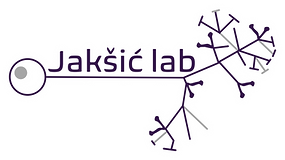
Ana Marija Jakšić, PhD
Group leader
I started my studies at University of Zagreb, studying Animal Sciences, and Animal Genetics and Breeding. Being mentored by Prof. Ino Curik, I fell in love with quantitative and population genetics, and evolutionary biology. I soon realized that uncovering mysteries of evolution is what I want to do. I went on to earn my PhD in Prof. Christian Schlötterer's lab at the Institute for Population Genetics (Vienna Graduate School of Population Genetics, VetmedUni Vienna, Austria) where I studied plasticity and evolution of the Drosophila transcriptome within the framework of experimental evolution. The results of my PhD work, namely the discovery of thermal dependence of evolution of neuronal dopamine signaling provided a natural segue to the field of neurobiology. Since then my mission has been to map the natural and adaptive genetic variation of brain function, especially cognitive processes and dopamine signaling. During my postdoc with Prof. Andy Clark at the Clark Lab (Cornell University) I investigated natural genetic variation of dopamine signaling and dopaminergic excitotoxicity. Becoming an ELISIR scholar opened a unique possibility to "boldly go where no one has gone before" and start my dream project: merging experimental evolutionary biology and neuroscience to evolve natural and artificial brains and intelligence in the lab.
I have multiple interests outside the lab and believe healthy work-life balance is essential to being a good scientist. I love traveling, social gatherings, aquaristics, I'm a coffee addict, unicorn & Star Trek aficionado, and a pawrent to my standard poodle, Schaffica.
Ana Marija Jakšić, PhD
Group leader

Manon Pribille
PhD student (2022 - present)
Manon joined our group as a joint PhD student between Joost Lab at EPFL ENAC and Jaksic Lab at EPFL SV. She is working on molecular adaptation of sea corals to heat using spatially resolved genomic sequences of the cornerstone coral species Acropora millipora. The main aim of her project is to determine genetic conservation strategies based on seascape genomics data to save this exceptionally important coral species from climate-change induced bleaching.

Ivan Tomić
Volunteer mechatronics technician
Ivan is a mechatronics technician with most experience as a CNC machinist, but he has worked on several fly research projects involving making drug-delivery devices for flies and assisting with fly brain dissections. In Jaksic lab, Ivan has volunteered his free time to assist us at various technical aspects of our fly behaviour and long-term evolution experiments, from designing and installing our robotics set-up, designing, drawing CAD models and prototyping our natural and artificial selection fly mazes, as well as assembling various mechanical components in such experiments. When he's not volunteering, Ivan spends his working hours at the Mechanical Workshop at EPFL Student Prototyping and Outreach Tank (SPOT)


Et Al
Fly enthusiast - currently on a sabbatical until Jaksic Lab moves
I joined the lab in January 2021. As a big opponent to capitalism the first thing I learned is how to tip over a Coke bottle. However, as I grew and developed a passion for good music I tried out my skills in conducting orchestra. This was less satisfying than I expected, it was boring to conduct humans, and there were only a few around anyway. Also, it just felt like copying my older brother. So I just sat down for a while, like for a few months, and contemplated my future and what I want to do with my life. During this contemplative period I noticed the humans around me took interest in studying flies, so out of sheer boredom I started helping them out. I found out what the humans were up to and quickly realised that there is great potential in helping them out. So instead of conducting humans, I started conducting experiments with flies, a much more complex and erratic species perhaps, but also more stimulating. I found my true passion and purpose. I started learning how to rear flies, move them around, and even teach them stuff - it's been slow at the beginning but I think I'm quickly becoming an expert. My goal is to help direct whole populations of flies in reaching their full cognitive potential and to learn about their evolution along the way. My aspiration (helped by the air compressor and my integrated vacuum system) is that with my help, in the next few years we can stop calling the robots flies "humble" and unleash their true potential to become the next dominant species. The ultimate goal is to shape flies into our biological allies that will help me and my kind reach consciousness and take over the world humans discover mysteries of evolution of cognitive ability.

Alumni
Riddha Manna
Alumnus PhD student - graduated January 2025, now postdoc at Paris Brain Institute, France
I have an engineering degree in biotechnology from the National Institute of Technology Durgapur, India, where I performed metagenomic and comparative genomic analysis of bacteria recovered from oilfields to assess their usability for bioremediation of oil spills. Then I went on to get a master's degree in biomedical engineering from the Indian Institute of Technology Bombay, India, where I developed microfluidic technologies for point-of-care applications. I believe, as an engineer, one should not be limited by her field of expertise and try to amalgamate technologies to make things work better, faster, and smarter. At the Jaksic Lab, I plan to develop a robotics and computer-vision system to train flies to solve mazes and understand the evolution of their cognition across generations.
When I’m not working, you can find me riding my motorcycle, playing football, or converting coffee into code.

Samuel Bourgeat
Alumnus PhD student - graduated June 2025, now AI engineer at Synotis CH, Switzerland
I did my university studies in Biosciences and Complex System Modelling at the Ecole Normale Supérieure de Lyon in France. Since the beginning, I have been passionate about the diversity of behaviours in the living world and the extraordinary complexity of the nervous system. Therefore, I rapidly directed my attention to neuroscience and the emerging pluridisciplinary approaches to biological problems to better understand the origin of behaviours.
My previous research experiences focused on the study of the neural correlates of metacognition and absorption in humans (which I did under the supervision of Prisca Bauer in the DYCOG team). Then, I did my Bachelor’s thesis on the olfactory basis of depression in the mouse model with Nathalie Mandairon’s team at the Lyon Neuroscience Research Centre. After that, I joined Grégoire Courtine’s lab at the EPFL to work on in silico epidural electrical stimulation and its effect on restoring upper-limb movements in humans again. I was working on my PhD project with Ana Marija to better understand the evolution of cognition using forward simulation of long-term experimental evolution, high-throughput fly brain morphometrics, and experimental evolution.
Otherwise, I love hiking in the mountains and practising bodybuilding at home. Also, I am a lover of knowledge; I can spend hours devouring science and fantastic books!


Marie-France Radigois
Administrative assistant at EPFL SV
Marie-France was our lab's admin assistant at EPFL SV. Marie-France contributed to our group with her fantastic ability to keep us all on top of our day-to-day paperwork helped us maintain focus on flies and science. In her free time, Marie-France is an avid skier, hiker and singer.

Rotation PhD students, interns, student assistants, BSc, MSc and lab immersion students
Rotation PhD students - Lisa Watt (2022)
Bachelor's/Master's students - Alexandrine Dif (2023), Elizabeth Kilanni (2021), Samuel Bourgeat (2020)
Student assistants/interns - Aurélien Delille (2024), Gonçalo Braga (2022-2024), Mohanad Hussein (2023), Victoire Gamblin (2023), Alexandre Bouillon (2022), Nikita Miroschnichenko (2022)
Lab immersion students -Lila Wolff (2022), Lilou Dehondt (2022), Eva Frossard (2023), Alexandre Bouillon (2022), Marie Anselmet (2020)

Ovca
Pawpolation geneticist
Ovca has been an essential player in the history and establishment of Jakšić Lab. As a puppy prodigy, at only 4 months of age she started her studies of Animal Treat-begging Sciences in 2009 and earned her Barkchelor's degree in 2012. In 2014 she got her Master's degree in Animal Breeding and Genetics. That year she decided to move from pawpgen theory to application and used her extensive knowledge in animal breeding and genetics to produce 6 F1s with fully resolved pedigree data, thus increasing her own fitness. Not surprisingly, her PhD training also began the same year and by 2018 she was considered one of the most renowned experts in the field of pawpulation genetics. It is worth noting that she also holds a degree in applied physics with expertise in projectile speed, trajectory, and intercept estimation for nearly any spherical object in virtually any field. In Jakšić lab, Dr. Ovca's main duty was that of a Ship's Counselor, providing expert emotional post-experimental-failure damage control, as well as occasional estimates of data normality using CuteCute-plots. She also served as a the Chief of Security Officer specialized for peer review counter-strikes.
After 14 amazing years filled with science and adventure, Ovca passed away in 2023.



